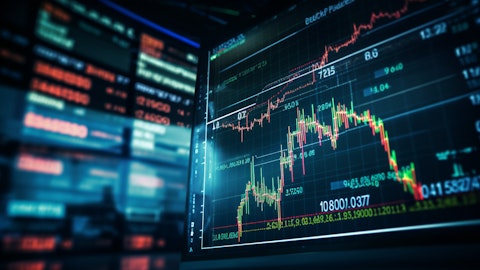In this article, we will take a detailed look at the 10 Buy-Rated Stocks with Latest Insider Purchases. For a quick overview of such stocks, read our article 5 Buy-Rated Stocks with Latest Insider Purchases.
Insider trading and its relationship with stock returns is a topic that has interested researchers for a long time. When insiders buy their own company shares, does that mean they know something outsiders don’t and they are piling into their company shares to profit in the long term? Many research papers would answer this question with a “yes” albeit with many ifs and buts. For example a research paper entitled “Insider Trading Patterns” tries to find out why and when insiders buy their own company names. The research, conducted by Lee Biggerstaff, David Cicerob and M. Babajide Wintoki, says that duration is very important while analyzing insider trades. When insiders buy or sell a stock for a long period of time, they may have a “longer-lived” informational advantage.
Insiders Preserve Their “Informational Advantage”
The research paper also concludes that insiders tend to “preserve” their informational advantage by disclosing their trades usually after the market closes. They also trade in a sequence of trades and trade more shares because of this disclosure pattern.
What does “sequence” of trades mean? The research paper says when an insider has an informational advantage of significant importance, they will try to avoid “conspicuously” large trades and instead try to spread their trades over a long period of time leading up to the key event about which they might be aware of. For example, if an executive is aware that his company is about to lose a key business relationship in the future, or an important R&D project is progressing positively towards its goal, they would begin to initiate insider trades with by careful sequencing instead of immediately buying or selling company shares in hefty amounts.
“Prior research has shown that larger trades tend to move prices and trade prices convey information about firm values to the market (Meulbroek, 1992; Gloston and Milgrom, 1985). Optimal trading strategies based on private information therefore involve sequences of trades to avoid sending strong signals (Kyle, 1985). In addition, according to a 2000 internal S.E.C. memorandum discussing the investigation of insider trading, one of the most relevant factors is the size of a trade, so those trading on private information have an incentive to avoid conspicuously large trades (Foster, 2000). Sequences of trades spread over longer horizons may therefore be motivated by private information that takes longer to be incorporated into prices. The alternative null hypothesis is that insiders spread their trades over longer periods of time when they are trading for liquidity or diversification purposes. There may be less immediacy to these trades if insiders are not trying to exploit a temporary informational advantage. Insiders may spread these trades out over time because they still face the reality that the market has limited depth and larger trades tend to move prices, which could cause them to realize less favorable average trading prices. Consistent with this expectation, Lebedeva, Maug, and Schneider (2012) demonstrate that insiders spread their trades out over time when they face liquidity constraints.”

Photo by Ruben Sukatendel on Unsplash
Which Industries are Seeing Insider Buying in 2024?
Are insiders buying or selling in 2024? According to an interesting analysis conducted by CDT Capital Management, a long-only hedge fund that keenly tracks insider activity, insiders started piling into the market in March after a two-month “hiatus.” CDT Insider Sentiment Ratio was 2.14 in March, which shows a strong insider sentiment. Among the most active sectors seeing insider activity in March 2024 included Software, Restaurants and Banks.
CDT said that insiders are apparently late to the party and it’s puzzling why insiders, who are usually contrarians, started buying during the Q1 rally. Many believe the market rally led by AI is spreading to other stocks and CDT also thinks this explains the latest insider buying activity:
“Our conclusion is that we suspect the market rally that we observed in Q1 has and will likely continue to broaden out to other sectors of the market. With more and more insiders raising their hand to proclaim untapped value, we expect the sectors of the market that have not received their fair share of attention will likely get some of the limelight in the near to medium term.”
Insider Monkey’s monthly newsletter and portfolio that focuses on activist hedge funds, insider trading and stock picks from hedge fund investor newsletters and conferences returned 199.2% between March 2017 and March 12, 2024 and outperformed the S&P 500 ETFs’ 144.9% gain by more than 54 percentage points. Some of the top stocks popular among hedge funds include Bank Of America Corp (NYSE:BAC), Coca-Cola Co (NYSE:KO) and Occidental Petroleum Corp (NYSE:OXY).
Methodology
For this article we first used a stock screener to identify stocks that saw insider buying activity over the past few days. We then narrowed down to the companies with Buy or better ratings from Wall Street analysts. We then calculated upside potential of these stocks based on average analyst price estimates for these companies and chose 10 of these stocks with the highest upside potential.
10. Concentrix Corp (NASDAQ:CNXC)
Average Analyst Price Target: $94
Upside Potential: 60%
Customer engagement and business performance solutions company Concentrix Corp (NASDAQ:CNXC) is one of the buy-rated stocks with recent insider purchases. On April 3, 2024, Jane Fogarty, the Executive Vice President of Legal at Concentrix, bought 400 shares at $61.04 apiece. Since this transaction the stock has gained about 2%.
9. HilleVax Inc (NASDAQ:HLVX)
Average Analyst Price Target: $29.25
Upside Potential: 100%
Boston, Massachusetts-based biotechnology company HilleVax Inc (NASDAQ:HLVX) saw insider buying activity in March when its Chief Operating Officer Sean McLoughlin piled into 1,250 shares of HilleVax Inc (NASDAQ:HLVX) at $16.98 per share. The transaction took place on March 28. Since then the stock has lost about 12% in value.
As of the end of the fourth quarter of 2023, 11 hedge funds tracked by Insider Monkey had stakes in HilleVax Inc (NASDAQ:HLVX).
8. Annexon, Inc. (NASDAQ:ANNX)
Average Analyst Price Target: $15
Upside Potential: 153.3%
Wells Fargo recently published a list of high-conviction, catalyst-driven stock opportunities for the second quarter. Annexon, Inc. (NASDAQ:ANNX) was part of the list. Wells Fargo said that the stock only trades at “$400MM enterprise value, we think the risk/reward (+130%/-50%) is skewed to the upside on the upcoming Phase 3 GBS data.”
On April 8, William H. Carson, a director at Annexon, Inc. (NASDAQ:ANNX), bought 3,200 shares at $6.07 each. Since then the stock is down 2%.
Unlike Bank Of America Corp (NYSE:BAC), Coca-Cola Co (NYSE:KO) and Occidental Petroleum Corp (NYSE:OXY), which are highly popular among hedge funds, ANNX is a small company with low hedge fund sentiment.
7. Pagaya Technologies Ltd (NASDAQ:PGY)
Average Analyst Price Target: $27.92
Upside Potential: 157%
Pagaya Technologies Ltd (NASDAQ:PGY) is one of the stocks both Wall Street analysts and insiders like. On April 5, Pagaya Technologies Ltd’s (NASDAQ:PGY) President Sanjiv Das bought over 22,000 shares of Pagaya Technologies Ltd (NASDAQ:PGY) at $10.57. Since then the stock is up 0.6%. Pagaya Technologies Ltd’s (NASDAQ:PGY) Chief People Officer Tami Rosen also bought 10,000 shares of Pagaya Technologies Ltd (NASDAQ:PGY) at $10.47 per share.
Unlike mature companies like Bank Of America Corp (NYSE:BAC), Coca-Cola Co (NYSE:KO) and Occidental Petroleum Corp (NYSE:OXY), Pagaya is a small company with strong upside potential.
6. Surrozen Inc (NASDAQ:SRZN)
Average Analyst Price Target: $33
Upside Potential: 225%
California-based biotechnology company Surrozen Inc (NASDAQ:SRZN) ranks sixth in our list of the stocks Wall Street analysts and corporate insiders like. Tim Kutzkey, a director and 10% owner at Surrozen Inc (NASDAQ:SRZN), bought 193,548 shares at $15.50 per share on April 4. Since then the stock has lost about 9% in value. The company’s management talked about important business updates and future opportunities during an earnings call last month:
“We’re excited with the multiple opportunities that lie ahead of Surrozen in 2023 and 2024. We’ve shared some of our key milestones and catalysts through 2024 on this slide. We shared our thoughts on cash runway into the second half of ’24 as we think about our key upcoming milestones and catalysts, and I’ll briefly highlight a few of these.
First, for SZN-043, as Craig mentioned, we’ve enrolled the first patient for chronic liver disease and expect to have data by the end of the year, and plan to initiate a Phase Ib clinical trial in 2024 with potential proof-of-concept data in the second half of 2024. As it relates to 1326, we’ve opened enrollment for the Phase I in healthy volunteers, and we expect to be able to have data by the end of the year, and we’ll initiate a Phase Ib trial in 2024 in UC patients and expect to have proof-of-concept data in the second half of ’24. As I’ve already mentioned, with SZN-413, which is partnered with Boehringer Ingelheim, we expect by the end of the year for them to nominate a candidate which will trigger a $10 million milestone payment, and as it relates to our research programs, we expect to nominate an additional program and/or partner that potential program.”
Read the full earnings call transcript here.
Click to continue reading and see 5 Buy-Rated Stocks with Latest Insider Purchases.
Suggested Articles:
- Insiders Are Buying These 11 Penny Stocks
- 10 Underperforming Stocks Insiders are Buying
- 10 Very High Yield Dividend Stocks Billionaires Are Piling Into
Disclosure. None. 10 Buy-Rated Stocks with Latest Insider Purchases was initially published on Insider Monkey.





